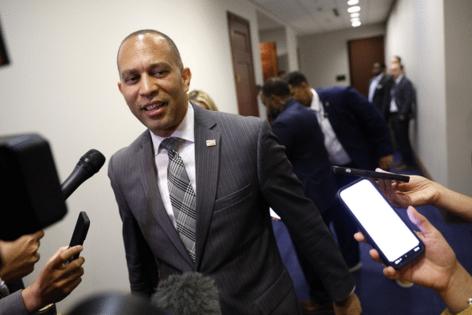Central Michigan gets central role in elections
Published in Political News
MADISON HEIGHTS, Mich. — If time is money, House leaders are investing in Michigan this week.
Majority Leader Steve Scalise, R-La., and Richard Hudson of North Carolina, the chair of the National Republican Congressional Committee, on Tuesday brought a crew of House Republicans to campaign with two candidates who are fighting for a pair of open seats in central Michigan that could be key to the party expanding its majority or offsetting losses elsewhere.
The following day, their Democratic opponents rallied with Minority Leader Hakeem Jeffries of New York, who hopes the party will hold both seats and boost his chances of becoming the next speaker.
Everywhere they go, the importance of Michigan this election is clear. In addition to these two toss-up contests, Democratic Rep. Elissa Slotkin is battling former GOP Rep. Mike Rogers in a toss-up Senate race. The performances of Vice President Kamala Harris and former President Donald Trump here could affect all three races.
The open House seats are for Michigan’s 7th and 8th districts, neighbors in central Michigan. Republican Tom Barrett, a former state senator, is facing Curtis Hertel, also a former state senator, in the Lansing-based 7th District. Paul Junge, a former Trump administration official, faces state Sen. Kristen McDonald-Rivet in the Flint-based 8th District.
The respective seats are open because of Slotkin’s Senate run and the coming retirement of Rep. Dan Kildee, another Democrat who succeeded his uncle in Congress. In both cases, Republicans turned to candidates who lost competitive races two years ago, and the party hopes name ID helps against candidates less well-known than the incumbents.
“Obviously a lot of these races are really close. There’s a lot of money being spent. But if you look at the Democrats’ attacks, it’s a generic lie about every Republican they’re attacking,” Scalise said Tuesday alongside Barrett after a tour of the Southeast Michigan Construction Academy, a nonprofit trade school teaching construction, welding and electrical courses.
“They’re using the exact same lie against everyone. We’re using very specific votes that the incumbent Democrats have taken that are against the wishes of the very people they’re representing, and that’s why our hits are landing much stronger,” Scalise said.
Democrats hope Hertel and McDonald-Rivet hold on to the seats. While campaigning Wednesday, Jeffries said the two would be common-sense leaders who’d get things done.
“This is a critically important race. The stakes are very high,” Jeffries said at a rally in Lansing on Wednesday with Hertel and union members. “Two different directions of what kind of House of Representatives we will have. What type of Senate we will have.”
Republicans are also hoping for a better showing than the party had two years ago in the midterm elections in Michigan, when Democrats won the governor’s mansion and control of both state legislative chambers, as well as three out of four of the state’s competitive House races. The party had a weak gubernatorial nominee and voters approved a referendum that enshrined abortion rights in the state constitution.
“Having Donald Trump at the top of the ticket really helps in a lot of these close races, and that’s something we did not have two years ago,” Scalise said. “You look at the governor’s race, two years ago was the top of the ticket, and our candidate way underperformed Gov. (Gretchen Whitmer), and that drug down all of our candidates for many other races. Much different story here with Donald Trump leading. It really rises all votes, and I think you’re seeing that with Mike Rogers in the Senate race and of course with Tom Barrett here.”
McDonald-Rivet said Democratic enthusiasm remains high, noting her four daughters are “every bit as energized as they were two years ago.”
Second time’s the charm?
Slotkin, a three-term House member and prodigious fundraiser, defeated Barrett two years ago by her largest margin of victory since first being elected in 2018. It was among the most expensive House races of the cycle.
This year, Barrett said he felt like he could run through the tape and be successful, comparing it to how he felt ahead of elections for his previous state legislature races. In his advertisements, he’s focused on his military background and featured his wife and kids.
“It was a different set of circumstances and I felt like we were climbing that hill, and I didn’t know if we would quite get there on Election Day or not,” Barrett said of his last race. “In this race I feel very strong that if we do the things we have to do, we continue to work hard, we continue to push over this next week that we should come out of this ahead.”
Barrett told reporters Tuesday he’s focusing his closing message on the contrasts between himself and his opponent, claiming Hertel’s stances on immigration are at odds with the district.
“He feels we owe a debt to every single illegal immigrant here, so those are the contrasts. Those are the things that we’re closing with, and those are the contrasts that I think are important to voters in the district,” he said.
Hertel has positioned himself as someone who would cross the aisle. He told reporters Wednesday he would join the bipartisan Problem Solvers Caucus. His campaign ads introduce him as a “regular guy.”
On immigration, he touts a letter he wrote to President Joe Biden this year calling on him to use executive authority to address the southern border. He said he would have supported a bipartisan Senate plan that stalled this year, which Trump pushed Republicans to reject.
“I think we need more hard safety measures at the border, hard structures, more investment in scanning for fentanyl and to fix our broken immigration system,” he told reporters Wednesday. “Nothing in Washington, D.C., gets done with one party. It all gets done with both parties sitting in a room and trying to solve problems. My opponent has never had a record of working across the aisle, and he said again that he would oppose this bipartisan deal.”
An Emerson College poll released Wednesday found Barrett leading Hertel 47% to 45%, within the error margin, and with 7% undecided.
“I was (knocking) doors yesterday in Lansing, not, arguably, your most Republican demographic … and happy to find quite a few people who had already voted for me or expressing they intended to vote for me. The cost of living and the southern border were their two biggest issues brought up,” Barrett said.
Hertel maintained the race remains close. He said people want to talk to him about issues like reproductive rights and lowering prescription drug prices, pushing back on GOP attack ads that say he’s a “liberal lobbyist.”
“That’s what elections are. But I always bet on ground game, and I can tell you that we’re launching all across this district,” he said. “What I’ll tell you is that close elections, ground game matters. Ground game wins, and we’re going to go out to every fair, festival, farmers market and door and have conversations with voters and win this race.”
Flinty campaigning
Kildee has held the 8th District seat for over a decade, and so his retirement opens up a clear opportunity for Republicans. Junge, who lost the 2022 race by 10 points, said running for an open seat “really does make a difference.”
“I got the truck with my name on it,” Junge said in an interview at Mueller’s Orchard and Cider Mill after campaigning with Scalise and Hudson. “If I’m at the gas station, I often have people come up and you know, say ‘Hey Paul, I like what you’re talking about. I like what I hear you saying.’”
Both candidates argued that they would be the best contender to lower costs and that too many families in the district are struggling financially. Junge said McDonald-Rivet’s votes in the state Senate aren’t addressing the problem. She argues she and her husband raised their family in the district, and notes Junge is largely self-funding his campaign.
The district became more Republican in the 2022 post-census redistricting process, but McDonald-Rivet said the shift has been toward “practicality.”
“What you see in this district are people who want a representative that speaks for them, who understands our communities,” she said. “We have a lot of families who are really worried about the cost of prescription drugs, about the cost of housing, and what they want are practical problem solvers with a record like mine frankly, of actually getting things done.”
Everyone agrees: Get out the vote
Both parties view the two races as close, but with other high-profile races, like for president and Senate also close, all four House candidates are seeking to break through. Candidates and party leaders urged their supporters who showed up to events to vote early and to encourage their friends and family to not sit out this election.
“I’ll tell you the most important thing, not only that everybody here votes and votes early, but you need to get everybody you have influence over and get them to the polls,” Hudson told supporters at the Junge rally. “It’s a cliche,” he said, but with so many tight contests, “every single vote is going to matter.”
Hertel encouraged his supporters to think back to how Democrats felt after the 2016 elections, and to consider if they had a time machine to go back to before that election.
“What would you have done knowing the results?” he asked.
_____
©2024 CQ-Roll Call, Inc., All Rights Reserved. Visit cqrollcall.com. Distributed by Tribune Content Agency, LLC.































































Comments